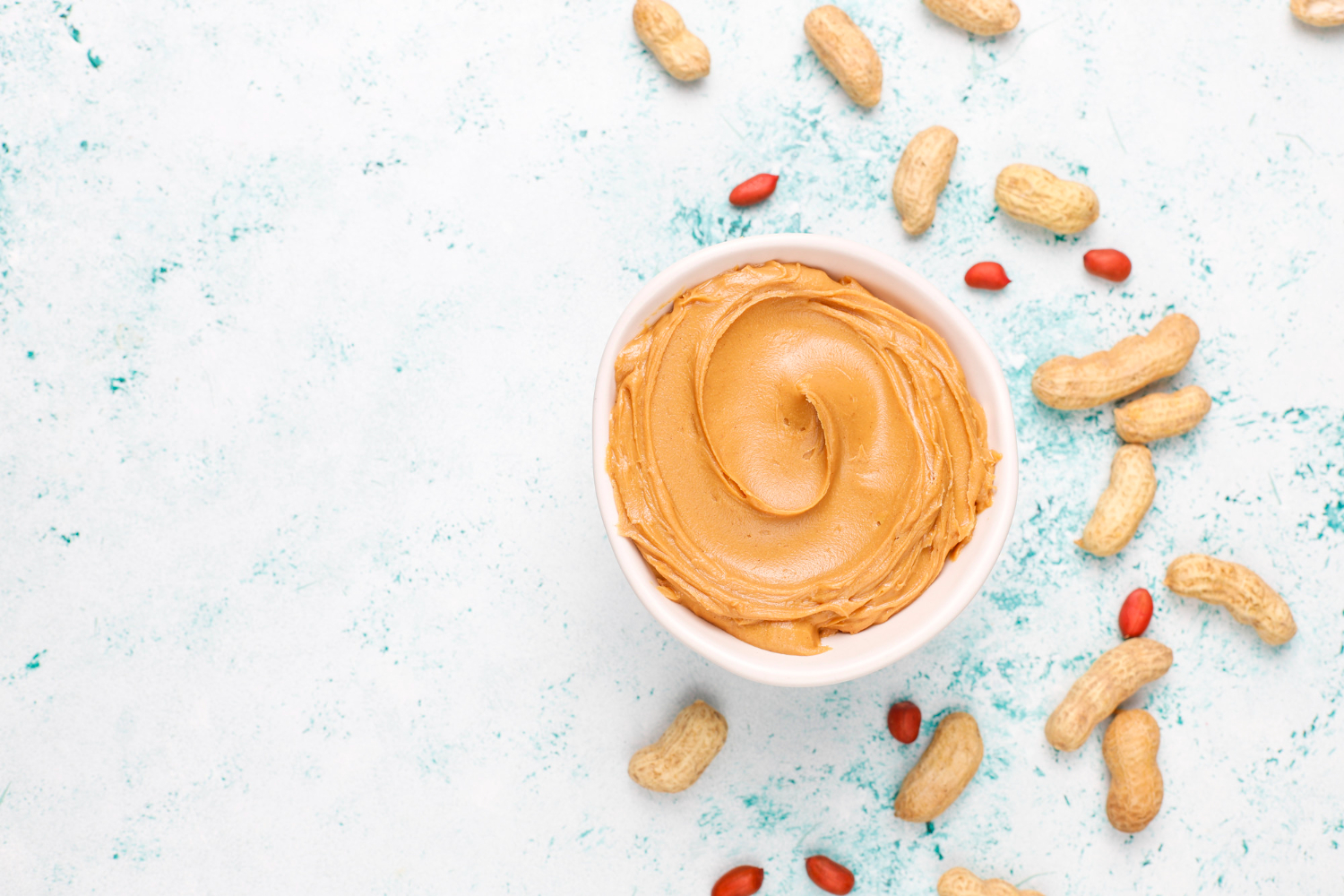Is peanut butter healthy for you? Peanut butter is a popular spread and is enjoyed by millions of people worldwide. Its creamy texture, nutty flavor, and versatility make it a staple in sandwiches, smoothies, baked goods, and more.
But what happens if you eat peanut butter every day? Is the peanut butter healthy, or is it bad to eat peanut butter every day?
In this article, we’ll explore is the peanut butter healthy and what are health effects of eating peanut butter every day.
Nutritional Profile of Peanut Butter
Before understanding the effects of eating peanut butter daily, it is essential to know its nutritional profile. Since peanut butter is prepared from roasted peanuts, here is the general list of nutrients that 2 tablespoons of peanut butter may contain (approximately 32 grams):
- 190-200 Calories
- 8 grams Protein
- 16-18 grams Fat (Mostly healthy unsaturated fats)
- 6-8 grams Carbohydrates
- 2 grams Fiber
Small amounts of vitamin E, magnesium, potassium, and B vitamins
Other beneficial nutrients in peanut butter are antioxidants like resveratrol and some omega-6 fatty acids, which are necessary for many bodily functions.
Possible Health Benefits of Eating Peanut Butter Every Day
The benefits of eating peanut butter every day can be as follows:
1. Protein Power
One of the most serious advantages of eating peanut butter daily is its protein content. Peanut butter is a plant-based protein significant in muscle repair, immune activity, and overall health.
Adding it to daily consumption may help an individual reach their daily protein requirement, especially if one follows a vegetarian or vegan diet.
2. Cardiovascular Health
The unsaturated fat composition, mainly monounsaturated fat, in peanut butter helps maintain heart health by promoting improved cholesterol levels and reducing cardiovascular risks.
If one consumes it every day, the healthy fats will reduce one’s “bad” LDL cholesterol while keeping or increasing the “good” HDL cholesterol to protect the heart.
3. Nutrient-Dense
In particular, peanut butter includes several key vitamins and minerals, such as antioxidants like vitamin E and magnesium, essential to muscle and nerve function, and potassium.
This mineral helps balance blood pressure. The daily intake of these crucial nutrients, if taken from peanut butter, can promote anything from skin health to energy production.
4. Weight Management
While peanut butter is dense in calories, adding healthy fats, protein, and fiber makes one feel full longer. This can reduce general calorie intake by curbing your appetite and making overeating less likely. Daily moderate peanut butter consumption is beneficial for weight management.
5. Blood Sugar Control
Peanut butter has a low glycemic index, so it does not lead to a sudden increase in blood sugar levels. Adding peanut butter to daily meals would be highly beneficial for diabetic patients and even those who try to avoid an imbalance in blood sugar levels.
6. Rich in Antioxidants
Resveratrol, an antioxidant in peanut butter, has been known to help reduce oxidative stress in the body. This relates directly to aging and many chronic diseases. Thus, when consumed daily, antioxidants can protect against inflammation and disease.
The Risks of Eating Peanut Butter Every Day
While peanut butter has many health benefits, especially in large portions, it can also present some setbacks. A look at the potential risks:
1. High Calorie Content
However, peanut butter is dense in calories because of its higher fat content. Thus, daily excess peanut butter consumption is associated with a potential weight increase.
If the total caloric consumption is not monitored or is above the maintenance level. Keep your portions small to make allowances within your daily energy intake.
2. Added Sugar and Sodium
Most peanut butter has added sugar, salt, and unhealthy fats to improve its taste and texture. When regularly consumed, these value-added ingredients can lead to obesity, hypertension, and a variety of other health conditions.
If you eat peanut butter daily, always prefer natural or unsweetened peanut butter to avoid these extra additives.
3.Omega-6 Fatty Acids
While omega-6 fatty acids are essential, they are overrepresented in typical diets. If you spread peanut butter on your toast every morning.
You could get too many omega-6s, especially if your diet is too low in omega-3s (found in oily fish, flaxseeds, and walnuts, for example). Imbalance can lead to inflammatory disease, a cause of chronic diseases such as heart disease.
4. Adverse Reactions
Peanut allergies are among the most common food allergies, especially among children, in individuals allergic to or sensitive to peanuts.
Eating peanut butter every day can cause dangerous allergic reactions that may be as serious as life-threatening anaphylaxis. Caution is always exercised when one is unsure about an individual’s status concerning certain allergens.
5. Aflatoxin Exposure
Like many other crops, peanuts are susceptible to mold growth, particularly aflatoxins—harmful substances produced by certain molds.
Although levels of aflatoxin in peanut butter are regulated, eating peanut butter daily in large quantities may increase exposure to this potential carcinogen. Aflatoxin exposure is typically not a concern unless peanuts are improperly stored or processed.
How Much Peanut Butter Should You Eat Each Day
Like most foods, the key is moderation. The general recommendation is to eat peanut butter in moderation, at about 2 tablespoons per day, or 32 grams.
This serving size offers a healthy dose of protein, fat, and other nutrients without adding too many calories to your diet. You should be more conscious of the serving size of a weight loss program.
Tips for Adding Peanut Butter to Your Diet
- Choose Natural Peanut Butter: Always go for natural peanut butter that contains only peanuts and maybe a little salt. Avoid those with added sugars, hydrogenated fats, or other ingredients you don’t need when eating peanut butter daily.
- Pair with Whole Grains or Fruits: Peanut butter on whole grain toast, apples, or bananas provides a balanced snack with protein and fiber.
- Mix into Smoothies: Adding a spoonful of peanut butter to your smoothie will give it an extra boost in protein and creaminess.
- Use as a Dip: It can be great for dipping vegetables like carrots or celery for a delicious and healthy snack.
Why Peanut Butter is Good for Healthy Weight Gain:
Peanut butter is considered an excellent choice for healthy weight gain management. Why eating peanut butter is healthy for ideal weight can be regarded from the following points:
1. High in Calories
One major reason peanut butter can help with healthy weight gain is that it contains many calories. A serving of about 2 tablespoons (32 grams) has approximately 190-200 calories.
Calories come from a mix of healthy fats, protein, and carbohydrates, all combined into a calorie-dense food that will help increase your intake without having to eat large volumes of food.
2. Rich in Healthy Fats
Smooth peanut butter is mainly made up of healthy fats, both monounsaturated and polyunsaturated fats. These are friendly to your heart and towards your overall health, as well as for the daily consumption of calories.
In addition to giving the body long-lasting energy, these fatty acids also aid in absorbing fat-soluble vitamins A, D, E, and K.
3. Good Source of Protein
Protein is a great nutrient that contributes to muscle growth and repair, especially when trying to gain weight healthily. Peanut butter contains approximately 8 grams of protein in every 2-tablespoon serving.
Having enough protein helps you build lean muscle mass, which is great for healthy weight gain, especially if combined with strength training or exercise.
4. Rich in Fiber to Keep You Full
Peanut butter also contains fiber, about 2 grams per serving, which helps you feel full and satisfied. When trying to gain weight, it’s important not to give in to unhealthy cravings to overeat.
Fiber helps regulate your blood sugar levels and allows for better digestion, so you can eat more without feeling bloated or too full.
5. Rich in Nutrients
Besides the macronutrients, peanut butter contains several essential vitamins and minerals that help overall health.
Among them are vitamin E, an antioxidant; magnesium, one of the minerals important in muscle functioning; and potassium.
Which helps maintain fluid balance and regulates blood pressure; and B vitamins, which support energy metabolism. These nutrients will help ensure that your weight gain is healthy and supports, not hinders, your body’s functions.
Conclusion: Is It Good to Eat Peanut Butter Every Day?
Eating peanut butter every day can be extremely good for health in moderation, as it helps maintain heart health, increases protein intake, and aids in weight management. It is a dense food that contains protein, healthy fats, and essential vitamins and minerals.
However, portion control is highly necessary since peanut butter contains many calories and can lead to excessive calorie intake when consumed in large amounts. Also, opting for natural or unsweetened peanut butter will keep off the added sugars and wrong fats.
Eating peanut butter every day can be included in a healthy diet if, like any food, the measure of consumption is correctly embraced while being part of a varied, nutrition-rich meal.
If you’re an individual with allergies or a unique situation regarding fat intake, make it known to your doctor and an expert nutritionist. They could find the right amount in case the one serving needs adjustment.
Disclaimer
Get Health Hacks is a digital publisher and providing health and wellness content as general information. Our purpose is to provide you information, hacks, and guides to learn and achieve health goals. The content on our website, newsletter, and socials including text, graphics, images, and other material is general in nature. You should have to consult your healthcare provider before starting any nutrition, diet plan, exercise, fitness training, and wellness program.



